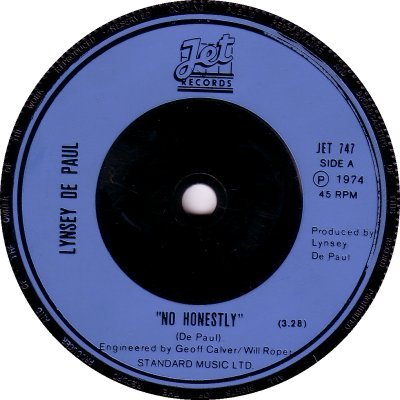
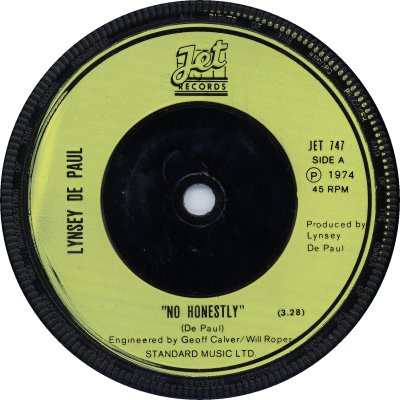
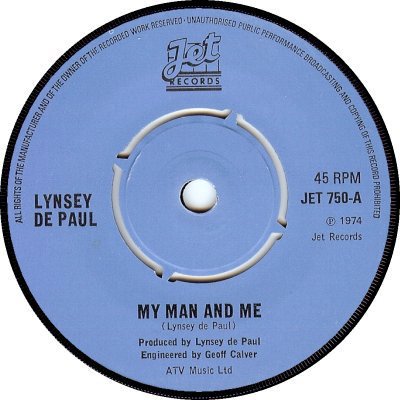
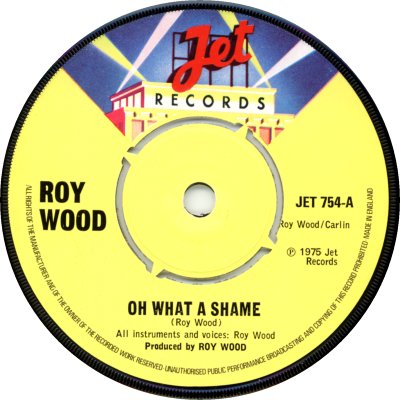
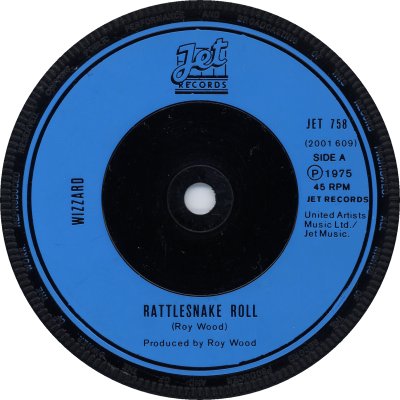
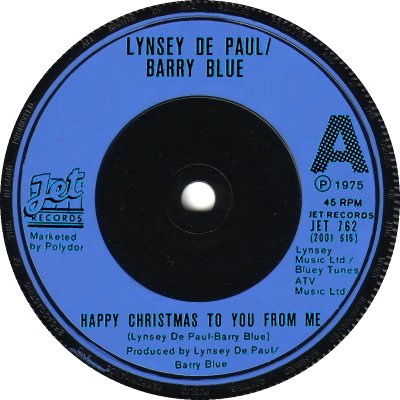
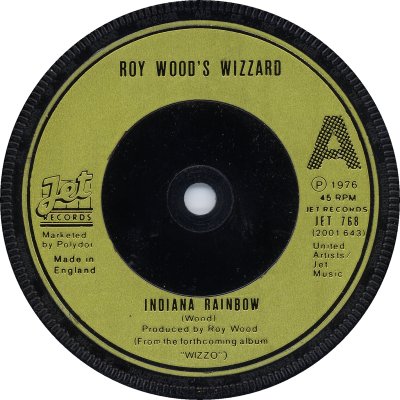
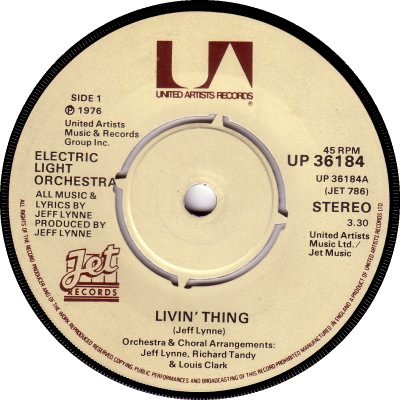
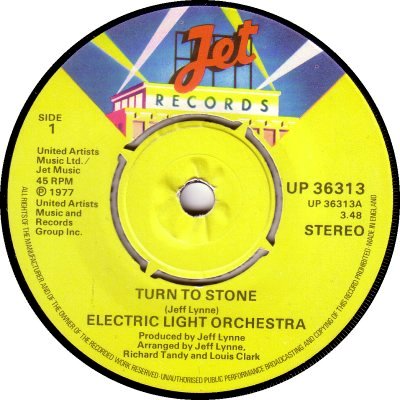
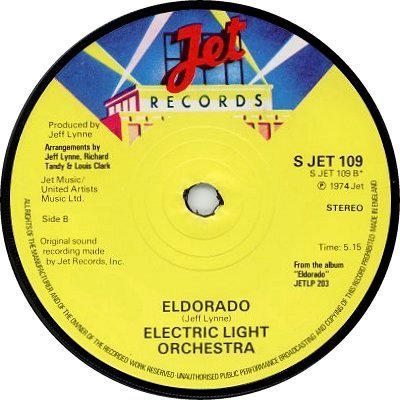
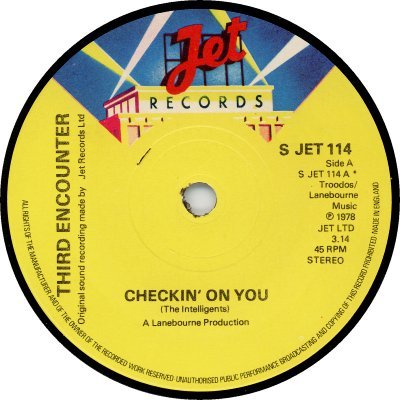
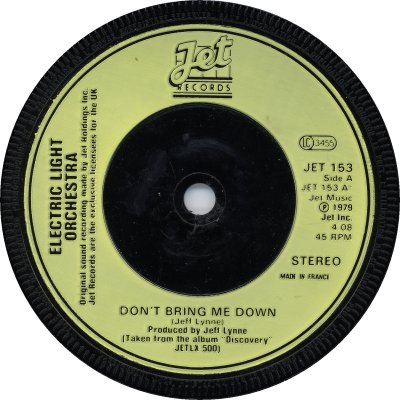
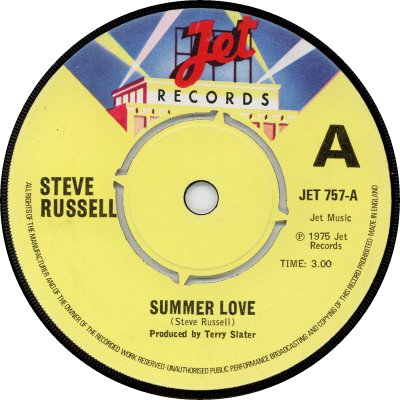
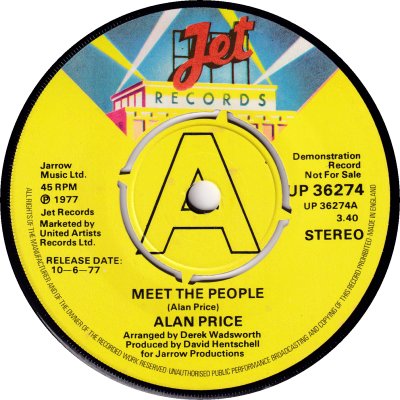
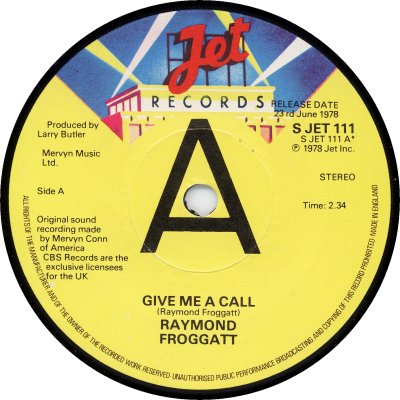
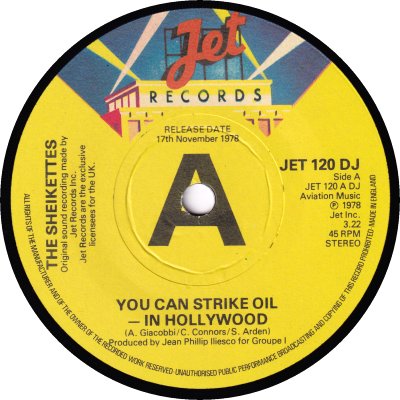
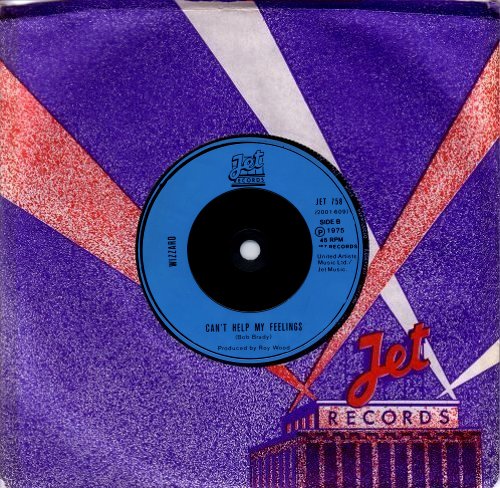
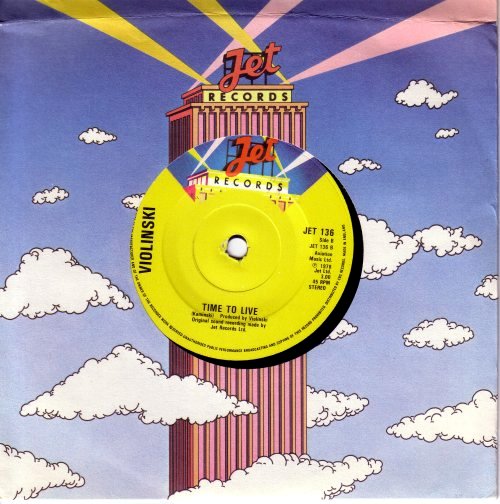
Jet was formed by ex-Warner Bros. general manager Des Brown and producer / managers Don and David Arden, whose Arden Management clients the Electric Light Orchestra provided the label with most of its successes. 'Music Week' of the 28th of September reported on the company's formation and said that its first single, Lynsey De Paul's 'No Honestly' b/w 'Central Park Arrest' (JET-747; 10/74) was available through Polydor in a one-off deal; an over-all distribution deal was being sought. Three more singles followed, again as one-off deals with Polydor. Then in March 1975 there came several quick changes. Initially 'MW' of the 1st of March claimed that Jet had signed a three-year distribution deal with Polydor; then the following week 'MW' of the 8th revealed that Des Brown had left amicably, citing policy differences; and finally 'MW' of the 15th broke the news that Jet had signed a distribution deal with Island, rather than with Polydor. The move came as a surprise: the Polydor general manager at the time was quoted as saying "Until Friday I thought we had a deal."
As it happened Jet only stayed with Island for seven months or so. Polydor had been handling the company's products for the rest of the world except North America, and having different companies carry out the various operations had caused 'immense difficulties' ('Billboard', 6th November 1976, looking back). As a consequence 'MW' of the 11th of October 1975 revealed that Jet was back with Polydor, this time as the result of a licensing deal. A year later, however, there came another move: 'MW' of the 30th of October 1976 told its readers that Jet had signed a new, worldwide, licensing deal, with United Artists. 'Billboard' of the 6th of November 1976 observed that this was the "third change in less than 18 months"; it quoted Don Arden as saying that one of the main problems in the past had been the co-ordination of releases, with pre-UK-release imports from overseas affecting UK sales, and he mentioned the 'immense difficulties' referred-to above.
Jet settled down with United Artists, and all seems to have gone well enough for a year and a half, but the purchase of UA by Artie Mogull and Jerry Rubinstein appears to have disrupted matters. 'MW' of the 15th of April 1978, reporting on the purchase, said that Jet's deal with United Artists - which it described as a distribution one rather than a licensing one, in contradiction to its report of the 30th of October 1976 - was not involved in the purchase and that the company would be free to pursue its own distribution agreements. Shortly afterwards Jet moved again, signing a marketing and distribution deal with CBS, effective from the 15th of May ('MW', 13th May 1978). The split with United Artists proved to be a fractious one, and 'MW' of the 6th of January 1976 revealed that UA was suing Jet and CBS over Jet's exit. A couple of months later EMI went to court and gained an injunction that would stop CBS selling the albums 'ELO' and 'ELO 2' outside North America ('MW', 3rd March 1979) - according to 'MW' of the 11th of April 1978 the acquisition by Mogull and Rubinstein had resulted in EMI getting international distribution rights to UA material, so that may have had something to do with the dispute. At the end of the legal tussle the court came down on EMI's side ('MW', 16th June 1979). Just as a note of interest, Billboard of the 8th of February 1978 claimed that Jet was going to set up a new label dedicated to New Wave music, 'Monster'. 'Music Week' of the 15th of July altered this somewhat, referring to Monster as a 'newly formed' 'licensed label' of Jet; the article stated that Snips had been signed, and that the first product was due in August. In the event, however, as James Denholm kindly points out, Monster only appeared as a production company logo on the Jet label rather than as a fully-fledged label in its own right, and its artists included Magnum and Bernie Tormé, who weren't exactly 'New Wave'. Singles bearing the logo included JETs 118, 126, 128, 130, 137, 155 and 163.
Jet stayed with CBS almost to the end of the 1980s, though releases were sporadic in the latter part of that decade; it seems not to have survived into the '90s in its original form. Its catalogue covered pretty much the whole spectrum of Rock and Pop, with some Disco items thrown in. It was no stranger to the Singles Charts: ELO were far and away its most successful act, but Lynsey De Paul, Alan Price and Ozzy Osbourne's Blizzard of Ozz all scored twice, and Roy Wood, Magnum, Violinski and Olivia Newton-John (with ELO) registered once apiece. Cirrus's 'Rollin' On' b/w 'Keep On Rollin'' (JET -123; 9/78) tickled the Top 75 mainly because of its being available as a rectangular brown single - this was before such novelties became commonplace. Numbering of the singles changed several times: it began at JET-747 and continued on in that series until the move to United Artists, after which point numbers were borrowed from UA's main UP-36000 series. The move to CBS resulted in the adoption of a JET-100 series, which, following the CBS fashion of the time, was given an 'S' prefix to denote stereo.
Jet's singles used basically the same label design throughout, although the Polydor connection resulted in injection moulded labels, made through Phonodisc, which needed to be simplified. These injection moulded labels were normally blue (1) but the occasional yellowy-green one appeared (2). Paper labels in the same plain design were used at first after the move to Island (3) - thanks to Robert Bowes for that scan. Lynsey De Paul's 'My Man And Me' b/w 'Dancing On A Saturday Night' (JET-750; 2/75) spanned the time of the transition and can be found with both Polydor's injection moulded labels and Island / EMI's paper ones. After the first couple of issues the the soon-to-be familiar yellow paper label (4) made its bow. When Jet returned to Polydor the blue injection-moulded labels came back, but his time around they had a Polydor 2001-000 matrix number under the Jet catalogue number (5). November 1975 saw a change in the layout: the logo and the artist name swapped places and a black 'A' appeared at two o'clock (6). For some reaon JET-768 was coloured metallic yellow-green rather than the usual blue (7).
Jet's first single with United Artists had a UA label with a Jet logo (8), but with the second release under the new deal the yellow labels were reintroduced and Jet became a separate entity again. As can be seen, the credits had a different appearance to that of the Island issues (9). The layout of the credits changed again with the move to CBS, in mid '78, though the label's design remained the same. Initially the artist's name was at 90 degrees on the left-hand side; for JETs-109 to 113 it moved to the bottom (10), but with JET-114 it moved back to the left (11) and it stayed there. Towards the end of the decade certain CBS singles appeared in injection moulded form, presumably as the result of contract pressings done by Phonodisc, and an occasional Jet single can be found that form; unlike most of the early releases these were coloured yellowy-green (12).
There were two different types of company sleeve: one with big searchlight beams during the Polydor era (17) and one with clouds after the move to CBS (18). The CBS ones were only in use for a year or so: 'MW' of the 5th of May 1979 stated that in future all Jet singles were to be issued in picture covers. With regard to demos: there were no Demo copies of Jet's injection moulded Polydor singles. During its short time at Island demo copies were marked discreetly with a small 'A' at 2 o'clock; this applies to both the blue and the yellow labels (13). United Artists Jet demos usually had a medium-sized hollow central 'A' and the appropriate text on their labels, after the UA fashion at that time (14); the 'A' solidified and grew in size during the first few months with CBS (15), returning to more modest proportions (16) in July 1978. The discography below only covers the 1970s.
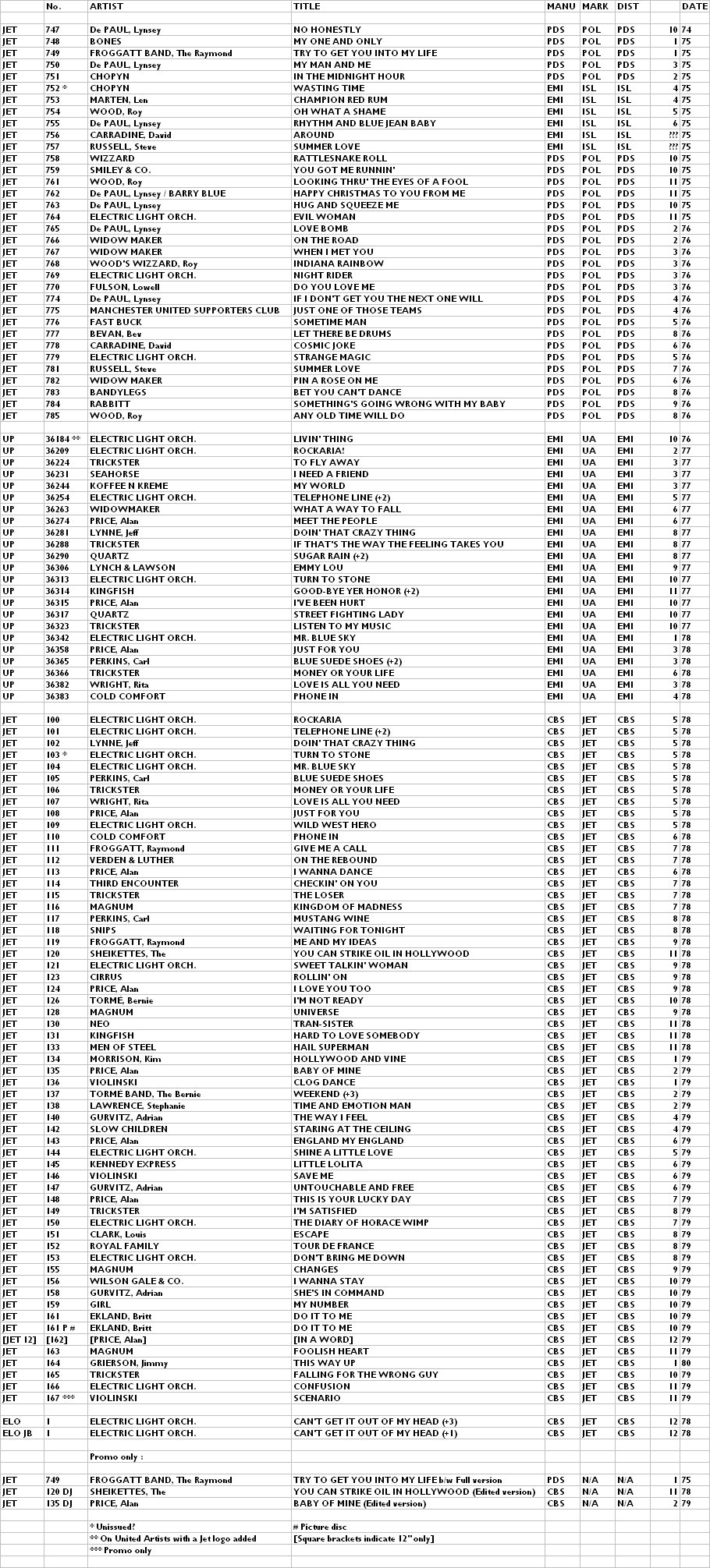


Copyright 2006 Robert Lyons.

